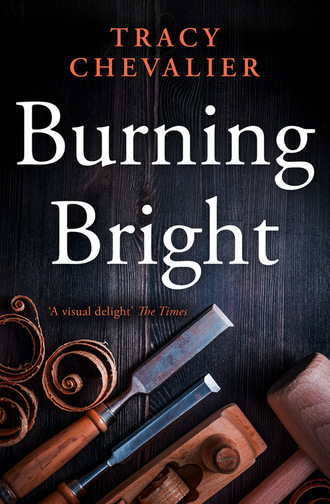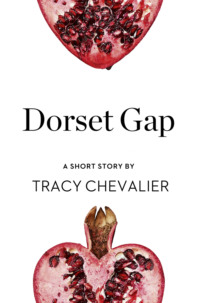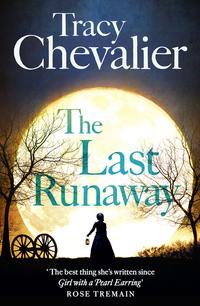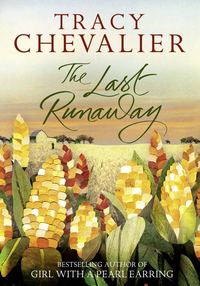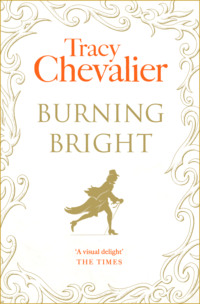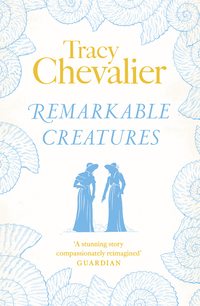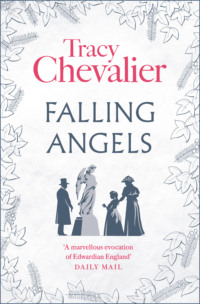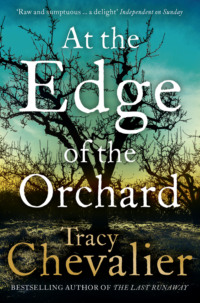‘This is highly irregular!’ she was shouting. ‘Highly irregular! Mr Astley knows very well that I choose my own lodgers, and always have done. He has no right to foist people on me. Do you hear me, Mr Fox? No right at all!’ She stood directly in the path of John Fox, who had come out of the house with his sleeves rolled up, followed by a few circus boys.
‘Pardon me, Miss Pelham,’ he said as he sidestepped her. ‘I’m just doing what the man told me to do. I expect he’ll be along to explain it himself.’
‘This is my house!’ Miss Pelham cried. ‘I’m the householder. He’s only the owner, and has nothing to do with what goes on inside.’
John Fox picked up a crate of saws, looking as if he wished he hadn’t said anything. Miss Pelham’s tone seemed also to bother the unattended cart horse, whose owner was also helping to carry the Kellaways’ possessions upstairs. It had been standing docilely, stunned into hoof-sore submission by the week-long journey to London, but as Miss Pelham’s voice grew higher and shriller, it began to shift and stamp.
‘You, girl,’ John Fox called to Maggie, ‘there’s a penny for you to hold the horse steady.’ He hurried through the gate and into the house, Miss Pelham at his heels, still complaining.
Maggie stepped up willingly and seized the horse’s reins, delighted to be paid for a front-row view of the proceedings. She stroked the horse’s nose. ‘There now, boy, you old country horse,’ she murmured. ‘Where you from, then? Yorkshire, is it? Lincolnshire?’ She named the two areas of England she knew anything about, and that was very little – only that her parents had come from those parts, though they’d lived in London twenty years. Maggie had never been outside of London; indeed, she rarely enough went across the river to its centre, and had never been a night away from home.
‘Dorsetshire,’ came a voice.
Maggie turned, smiling at the singing, burring vowels of the girl who had carried her chair inside and come out again, and was now standing next to the cart. She wasn’t bad-looking, with a rosy face and wide blue eyes, though she did wear a ridiculous frilly mob cap that she must have fancied would go down well in a city. Maggie smirked. One glance told her this family’s story: they were from the countryside, come to London for the usual reason – to make a better living here than they did back home. Indeed, sometimes country people did do better. Other times – ‘Where’s home, then?’ she said.
‘Piddletrenthide,’ the girl answered, drawing out the last syllable.
‘Lord a mercy – what did you say?’
‘Piddletrenthide.’
Maggie snorted. ‘Piddle-dee-dee, what a name! Never heard of it.’
‘It mean thirty houses by the River Piddle. ’Tis in the Piddle Valley, near Dorchester. It were a lovely place.’ The girl smiled at something across the road, as if she could see Dorsetshire there.
‘What’s your name, then, Miss Piddle?’
‘Maisie. Maisie Kellaway.’
The door to the house opened, and Maisie’s mother reappeared. Anne Kellaway was tall and angular, and had her scrubby brown hair pulled back in a bun that hung low on her long neck. She gave Maggie a suspicious look, the way a chandler would at someone he thought had stolen wares from his shop. Maggie knew such looks well.
‘Don’t be talking to strangers, Maisie,’ Anne Kellaway scolded. ‘Han’t I warned you about London?’
Maggie shook the horse’s reins. ‘Now, ma’am, Maisie’s perfectly safe with me. Safer’n with some.’
Anne Kellaway fastened her eyes on Maggie and nodded. ‘You see, Maisie? Even the locals say there be bad sorts about.’
‘That’s right, London’s a wicked place, it is,’ Maggie couldn’t resist saying.
‘What? What kind of wicked?’ Anne Kellaway demanded.
Maggie shrugged, caught out for a moment. She did not know what to tell her. There was one thing, of course, that would clearly shock her, but Maggie would never tell that to Anne Kellaway. ‘D’you know the little lane across Lambeth Green, what runs from the river through the fields to the Royal Row?’
Maisie and Anne Kellaway looked blank. ‘It’s not far from here,’ Maggie continued. ‘Just over there.’ She pointed across the road, where fields stretched almost unbroken to the river. The red-brick towers of Lambeth Palace could be seen in the distance.
‘We only just arrived,’ Anne Kellaway said. ‘We han’t seen much.’
Maggie sighed, the punch taken out of her tale. ‘It’s a little lane, very useful as a short cut. It was called Lovers’ Lane for a time ’cause—’ she stopped as Anne Kellaway shook her head vehemently, her eyes darting at Maisie.
‘Well, it was called that,’ Maggie continued, ‘but do you know what it’s called now?’ She paused. ‘Cut-Throat Lane!’
Mother and daughter shuddered, which made Maggie smile grimly.
‘Tha’ be no great thing,’ a voice chimed in. ‘We’ve a Dead Cat Lane back in the Piddle Valley.’ The boy who had been carrying the chair inside was standing in the doorway.
Maggie rolled her eyes. ‘A dead cat, eh? I suppose you found it, did you?’
He nodded.
‘Well, I found the dead man!’ Maggie announced triumphantly, but even as she said it she felt her stomach tighten and contract. She wished now that she’d kept quiet, especially as the boy was watching her closely, as if he knew what she was thinking. But he couldn’t know.
She was saved from having to say more by Anne Kellaway, who clutched the gate and cried, ‘I knew we should never have come to London!’
‘There, now, Ma,’ Maisie murmured, as if soothing a child. ‘Let’s get some things inside now. What about these pots?’
Jem let Maisie calm their mother. He had heard often enough during their journey of her worries about London. She had never betrayed such nerves in Dorsetshire, and her rapid transformation from capable countrywoman to anxious traveller had surprised him. If he paid too much attention to her, he began to feel anxious himself. He preferred instead to study the girl holding the horse. She was lively looking, with tangled black hair, brown eyes fringed with long lashes, and a V-shaped smile that made her chin as pointy as a cat’s. What interested him most, however, was seeing the terror and regret that flashed across her face as she mentioned the dead man; when she swallowed, he felt sure she was tasting bile. Despite her cockiness, Jem pitied her. After all, it was certainly worse to discover a dead man than a dead cat – though the cat had been his, and he’d been fond of it. He had not, for instance, found his brother, Tommy; that grim task had been left to his mother, who had run into the workshop from the garden, a look of horror on her face. Perhaps that explained her anxiety about everything since then.
‘What you doin’ at Hercules Buildings, then?’ Maggie said.
‘Mr Astley sent us,’ Jem answered.
‘He invited us to London!’ Maisie interjected. ‘Pa fixed a chair for him, and now he’s come to make chairs in London.’
‘Don’t say that man’s name!’ Anne Kellaway almost spat the words.
Maggie stared at her. Few people had a bad word to say about Philip Astley. He was a big, booming, opinionated man, of course, but he was also generous and good-natured to everyone. If he fought you, he forgot it a moment later. Maggie had taken countless pennies off him, usually for simple tasks like holding a horse still for a moment, and had been allowed in free to see shows with a wave of his liberal hand. ‘What’s wrong with Mr Astley, then?’ she demanded, ready to defend him.
Anne Kellaway shook her head, grabbed the pots from the cart, and strode up to the house, as if the man’s name were physically propelling her inside. ‘He’s one of the best men you’ll meet in Lambeth!’ Maggie called after her. ‘If you can’t stomach him you won’t find no one else to drink with!’ But Anne Kellaway had disappeared upstairs.
‘Is this all of your things?’ Maggie nodded at the cart.
‘Most of it,’ Maisie replied. ‘We left some with Sam – he’s our older brother. He stayed behind. And – well – we’d another brother too, but he died not long ago. So I’ve only had brothers, you see, though I did always want a sister. D’you have sisters?’
‘No, just a brother.’
‘Ours be marrying soon, we think, don’t we, Jem? To Lizzie Miller – he been with her for years now.’
‘Come on, Maisie,’ Jem interrupted, reluctant to have his family’s business made public. ‘We need to get these inside.’ He picked up a wooden hoop.
‘What’s that for, then?’ Maggie asked.
‘A chair mould. You bend wood round it to make it into the shape of a chair back.’
‘You help your pa make chairs?’
‘I do,’ Jem answered with pride.
‘You’re a bottom catcher, you are!’
Jem frowned. ‘What d’you mean?’
‘They call footmen fart catchers, don’t they? But you catch bottoms with your chairs!’ Maggie barked with laughter as Jem turned bright red. It didn’t help that Maisie joined in with her own tinkling laugh.
Indeed, his sister encouraged Maggie to linger, turning back as she and Jem reached the door with the hoops looped around their arms. ‘What’s your name?’ she called.
‘Maggie Butterfield.’
‘Oh, you be a Margaret too! In’t it funny, Jem? The first girl I meet in London and she do have my name!’
Jem wondered how one name could be attached to two such different girls. Though not yet wearing stays the way Maisie did, Maggie was fuller and curvier, padded by a layer of flesh that reminded Jem of plums, while Maisie was slim, with bony ankles and wrists. Though intrigued by this Lambeth girl, he didn’t trust her. She may even steal something, he thought. I’ll have to watch her.
Immediately he felt ashamed of the thought, though it didn’t stop him from glancing out of the open front window of their new rooms a few minutes later to make sure Maggie wasn’t rummaging in their cart.
She wasn’t. She was holding Mr Smart’s horse steady, patting its neck as a carriage passed. Then she was sniggering at Miss Pelham, who had come back outside and was discussing her new lodgers in a loud voice. Maggie seemed unable to keep still, hopping from one foot to the other, her eyes caught by passers-by: an old woman walking along who cried out, ‘Old iron and broken glass bottles! Bring ’em to me!’, a young girl going the opposite way with a basket full of primroses, a man pulling the blades of two knives across each other, calling out above the clatter, ‘Knives sharpened, get your knives sharpened! You’ll cut through anything when I’m done with you!’ He pulled his knives close to Maggie’s face and she flinched, jumping back as he laughed. She stood watching the man go, trembling so that the Dorsetshire horse bowed his head towards her and nickered.
‘Jem, open that window wider,’ his mother said behind him. ‘I don’t like the smell of the last people.’
Jem pushed up the sash window, and Maggie looked up and saw him. They stared at each other, as if daring the other to look away first. At last Jem forced himself to step back from the window.
Once the Kellaways’ possessions were safely upstairs, they all went back out to the street to say goodbye to Mr Smart, who would not stay the night with them, being anxious to make a start back to Dorsetshire. He’d already seen enough of London to provide weeks of anecdotes at the pub, and had no desire to be there still come nightfall, when he was sure the devil would descend on the inhabitants – though he didn’t say so to the Kellaways. Each found it hard to let go of their last link to the Piddle Valley, and delayed Mr Smart with questions and suggestions. Jem held on to the side of the cart while his father discussed which travelling inn to aim for; Anne Kellaway sent Maisie up to dig out a few apples for the horse.
At last Mr Smart set off, calling ‘Good luck an’ God bless’ee!’ as he pulled away from no. 12 Hercules Buildings, muttering under his breath, ‘An’ God help’ee too.’ Maisie waved a handkerchief at him even though he didn’t look around. As the cart turned right at the end of the road, slipping in among other traffic, Jem felt his stomach twist. He kicked at some dung the horse had left behind, and though he could feel Maggie’s eyes on him, he didn’t look up.
A few moments later, he sensed a subtle shift in the sounds of the street. Although it continued to be noisy with horses, carriages and carts, as well as the frequent cries of sellers of fish and brooms and matches, of shoe blackeners and pot menders, there seemed to be a quiet pause and a turning of attention that wound its way along Hercules Buildings. It reached even to Miss Pelham, who fell silent, and Maggie, who stopped staring at Jem. He looked up then, following her gaze to the man now passing. He was of medium height, and stocky, with a round, wide face, a heavy brow, prominent grey eyes, and the pale complexion of a man who spends much of his time indoors. Dressed simply in a white shirt, black breeches and stockings, and a slightly old-fashioned black coat, he was most noticeable for the red cap he wore, of a sort Jem and never seen, with a peak flopped over, a turned-up rim, and a red, white and blue rosette fixed to one side. It was made of wool, which in the unusual March heat caused sweat to roll down the man’s brow. He held his head slightly self-consciously, as if the hat were new, or precious, and he must be careful of it; and as if he knew that all eyes would be on it – as indeed, Jem realised, they were.
The man turned in at the gate next to theirs, stepped up the path, and hurried inside, closing the door behind him without looking around. When he had disappeared the street seemed to shake itself like a dog caught napping, and activity was renewed all the more vigorously.
‘Do you see – that is why I must speak with Mr Astley immediately,’ Miss Pelham declared to John Fox. ‘It’s bad enough living next door to a revolutionary, but then to be forced to take in strangers from Dorsetshire – it’s too much, really!’
Maggie spoke up. ‘Dorsetshire an’t exactly Paris, ma’am. I bet them Dorseters don’t even know what a bonnet rouge is – do you, Jem, Maisie?’
They shook their heads. Though Jem was grateful to Maggie for speaking up for them, he wished she wouldn’t rub his nose in his ignorance.
‘You, you little scamp!’ Miss Pelham cried, noticing Maggie for the first time. ‘I don’t want to see you round here. You’re as bad as your father. You leave my lodgers alone!’
Maggie’s father had once sold Miss Pelham lace he claimed was Flemish, but it unravelled within days and turned out to have been made by an old woman just down the road in Kennington. Though she hadn’t had him arrested – she was too embarrassed that her neighbours would find out she’d been duped by Dick Butterfield – Miss Pelham spoke ill of him whenever she could.
Maggie laughed; she was used to people berating her father. ‘I’ll tell Pa you said hello,’ she simpered, then turned to Jem and Maisie. ‘Bye for now!’
‘Z’long,’ Jem replied, watching her run along the street and disappear into an alley between two houses. Now she was gone he wanted her back again.
‘Please, sir,’ Maisie said to John Fox, who was just setting out with the circus boys to return to the amphitheatre. ‘What’s a bonnet rouge?’
John Fox paused. ‘That’ll be a red cap like what you just saw your neighbour wearing, miss. They wears it what supports the revolution over in France.’
‘Oh! We did hear of that, didn’t we, Jem? Tha’ be where they let all those people out of the Bastille, weren’t it?’
‘That’s the one, miss. It don’t have much to do with us here, but some folks like to show what they think of it.’
‘Who be our neighbour, then? Is he French?’
‘No, miss. That’ll be William Blake, born and bred in London.’
‘You leave him be, you children,’ Miss Pelham cut in. ‘You don’t want to get in with him.’
‘Why not?’ Maisie asked.
‘He prints pamphlets with all sorts of radical nonsense in them, that’s why. He’s a stirrer, that man is. Now, I don’t want to see any bonnets rouges in my house. D’you hear me?’
FIVE
Maggie came to see the Kellaways a week later, waiting until she judged they were well settled into their rooms. She had passed along Hercules Buildings a number of times, and always looked up at their front window, which they had quickly learned to keep shut so that the dust from the road wouldn’t get inside. Twice she had seen Anne Kellaway standing at the window, hands pressed to her chest, looking down at the street. When she caught sight of Maggie, she stepped back, frowning.
This time no one was looking out. Maggie was about to throw a pebble at the window to get their attention when the front door opened and Maisie came out carrying a brush and dustpan. She opened the front gate and with a twist of her wrist emptied the pan full of wood shavings onto the road, looking around as she did. On spotting Maggie, she froze, then giggled. ‘Ar’ernoon, Maggie! Is’t all right just to throw it in the road like that? I do see others throw worse.’
Maggie snorted. ‘You can chuck what you like in the gutter. But what you doing throwin’ out wood shavings? Anyone else’d burn them in the fire.’
‘Oh, we’ve plenty for that – too much, really. I throw away most of what I sweep up. Some of this be green too an’ don’t burn so well.’
‘Don’t you sell the extra?’
Maisie looked puzzled. ‘Don’t reckon we do.’
‘You should be sellin’ that, you should. Plenty could do with shavings to light their fires with. Make yourself a penny or two. Tell you what – I could sell it for you, and give you sixpence out of every shilling.’
Maisie looked even more confused, as if Maggie were talking too fast. ‘Don’t you know how to sell things?’ Maggie said. ‘You know, like that.’ She indicated a potato seller bellowing, ‘Lovely tatties, don’t yer want some tatties!’ vying with a man who was crying out, ‘You that are able, will you buy a ladle!’
‘See? Everybody’s got summat to sell.’
Maisie shook her head, the frills on her mob cap fluttering around her face. ‘We didn’t do that, back home.’
‘Ah, well. You got yourself sorted out up there?’
‘Mostly. It do take some getting used to. But Mr Astley took Pa and Jem to a timber yard down by the river, so they’re able to start work on the chairs he wants.’
‘Can I come up and see?’
‘Course you can!’
Maisie led her up, Maggie keeping quiet in case Miss Pelham was hovering about. At the top of the stairs, Maisie opened one of two doors and called out, ‘We’ve a visitor!’
As they entered the back room that served as his workshop, Thomas Kellaway was turning a chair leg in a lathe, with Jem at his side, watching him work. He wore a white shirt and mustard-coloured breeches, and over that a leather apron covered with scratches. Rather than frowning, as many do when they are concentrating, Thomas Kellaway was smiling a small, almost silly smile. When at last he did look up, his smile broadened, though to Maggie it seemed he was not sure what he was smiling at. His light blue eyes looked her way, but his gaze seemed to fall just beyond her, as if something in the hallway behind caught his attention. The lines around his eyes gave him a wistful air, even as he smiled.
Jem, however, did look directly at Maggie, with an expression half pleased, half suspicious.
Thomas Kellaway rolled the chair leg between his hands. ‘What’d you say, Maisie?’
‘D’you remember Maggie, Pa? She held Mr Smart’s horse while we was unloading our things here. She lives – oh, where do you live, Maggie?’
Maggie shuffled her feet in the wood shavings that covered the floor, embarrassed by the attention. ‘Across the field,’ she mumbled, gesturing with her hand out of the back window, ‘at Bastille Row.’
‘Bastille Row? There be an odd name.’
‘It’s really York Place,’ Maggie explained, ‘but we call it Bastille Row. Mr Astley built the houses last year with money he made off a spectacle he put on of the storming of the Bastille.’
She looked around, astonished at the mess the Kellaways had managed to make in the room after only a few days. It was as if a timber yard, with its chunks and planks and splinters and shavings of wood, had been dumped indoors. Scattered among the wood were saws, chisels, adzes, augers and other tools Maggie didn’t recognise. In the corner she could see tin pots and troughs, filled with liquid. There was a smell in the air of resin and varnish. Here and there she could find order: a row of elm planks leaning against the wall, a dozen finished chair legs stacked like firewood on a shelf, wood hoop frames hanging in descending size from hooks.
‘Didn’t take you long to make yourself at home! Does Miss Pelham know what you’re doin’ up here?’ she asked.
‘Pa’s workshop were out in the garden back home,’ Jem said, as if to explain the disorder.
Maggie chuckled. ‘Looks like he thinks he’s still outside!’
‘We keep the other rooms tidy enough,’ replied Anne Kellaway, appearing in the doorway behind them. ‘Maisie, come and help me, please.’ She was clearly suspicious of Maggie, and wanted to keep an eye on her daughter.
‘Look, here be the seat for the chair Pa’s making specially for Mr Astley,’ Maisie said, trying to put off leaving her new friend. ‘Extra wide to fit him. See?’ She showed Maggie an oversized, saddle-shaped seat propped against other planks. ‘It has to dry out a bit more; then he can add the legs and back.’
Maggie admired the seat, then turned to look out of the open window, with its view over Miss Pelham’s and her neighbours’ back gardens. The gardens of Hercules Buildings houses were narrow – only eighteen feet across – but they made up for this deficiency with their length. Miss Pelham’s garden was a hundred feet long. She made the most of the space by dividing it into three squares, with a central ornament gracing each: a white lilac in the square closest to the house, a stone birdbath in the central square, and a laburnum tree in the back square. Miniature hedges, gravelled paths and raised beds planted with roses created regular patterns that had little to do with nature but were more concerned with order.
Miss Pelham had made it plain that she did not want the Kellaways hanging about in her garden other than to use the privy. Every morning, if it wasn’t raining, she liked to take a teacup full of broth – its dull, meaty smell visiting the Kellaways upstairs – and sit with it on one of two stone benches that faced each other sideways, halfway along the garden. When she got up to go inside again she would dump the remains over a grapevine growing up the wall next to the bench. She believed the broth would make the vine grow faster and more robust than that of her neighbour, Mr Blake. ‘He never prunes his vine, and that is a mistake, for all vines need a good pruning or the fruit will be small and sour,’ Miss Pelham had confided to Jem’s mother in a momentary attempt to reconcile herself to her new lodgers. She soon discovered, however, that Anne Kellaway was not one for confidences.
Apart from Miss Pelham’s broth times and the twice-weekly visit from a man to rake and prune, the garden was usually deserted, and Jem went into it whenever he could, even though he could see little use for one like this. It was a harsh, geometrical place, with uncomfortable benches and no lawn to lie on. There was no space in which to grow vegetables and no fruit trees apart from the grapevine. Of all the things Jem expected from the outdoors – fertile soil, large vibrant patches of growth, a solidity that changed daily and yet suggested permanence – only the varied ranges of green he craved were available in Miss Pelham’s garden. That was why he went there – to feast his eyes on the colour he loved best. He stayed as long as he could, until Miss Pelham appeared at her window and waved him out.
Now he joined Maggie at the window to look out over it.
‘Funny to see this from above,’ she said. ‘I only ever seen it from there.’ She indicated the brick wall at the far end of the garden.
‘What, you climb over?’


